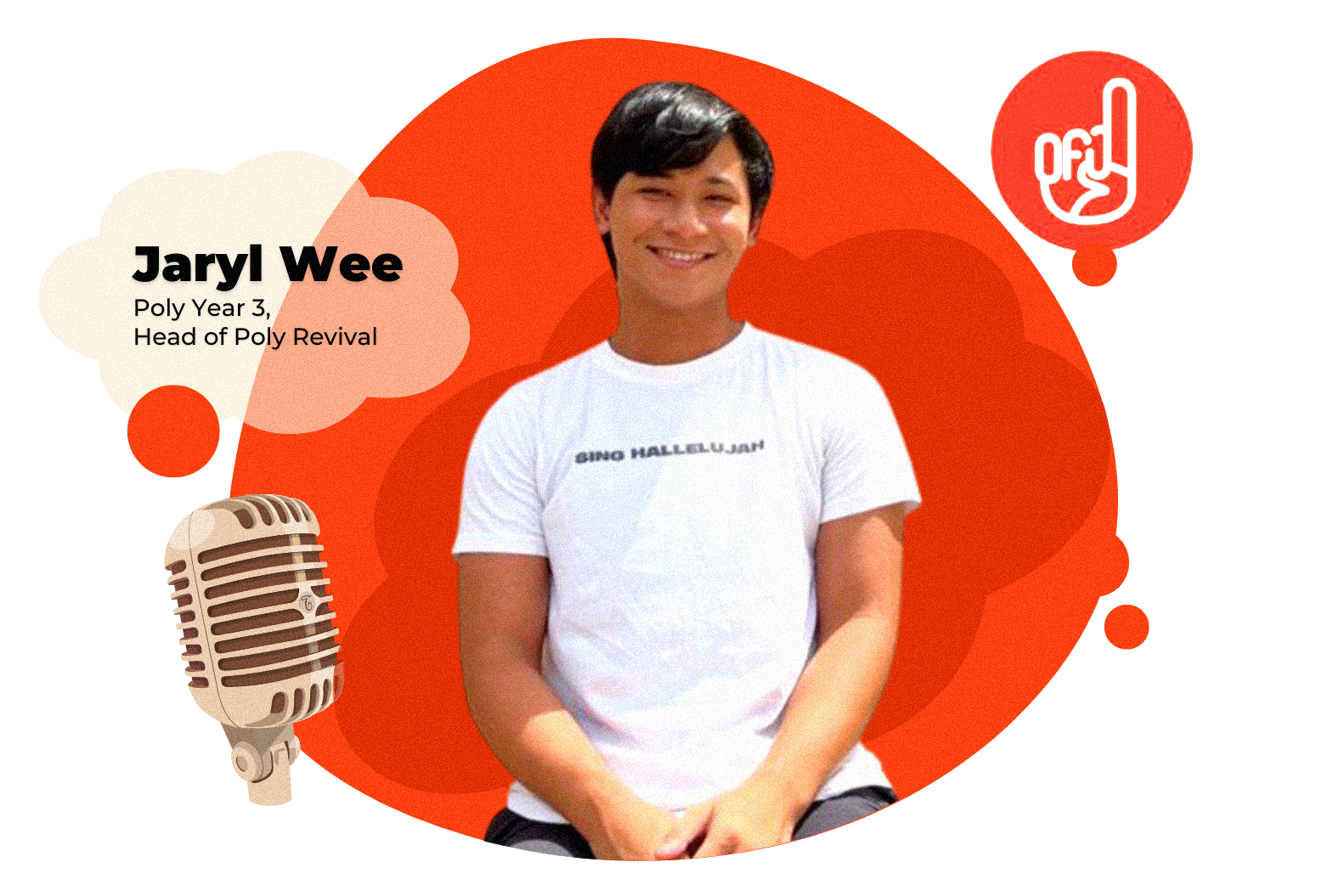Earlier this year, One For Jesus held a conversation with youths on what it means to share the Gospel in schools.
The conversation featured young guests from various school-based evangelistic communities:
- Jael Eu (Uni Year 3, President of NTU Cru)
- Emmanuel Wong (NSF, Head of Praying Schools‘ Youth Fellowship)
- Jaryl Wee (Poly Year 3, Head of Poly Revival)
Facilitated by Ivan Low from One For Jesus, the panellists touched on topics like the struggles faced during evangelism and the evolving nature of evangelism amidst the pandemic, and also offered practical handles for students who wish to share the Gospel.
Ready for a dose of evangelistic insight? Read on!
What does evangelism look like to you in this season?

Emmanuel: When I was still in junior college, one thing I said to my guys was: “Jesus does not expect you to save the world. He did that already, but He wants you to look out for the ‘one’.”
So for me, evangelism is always about reaching out to the “one” person: The lost person, the rejected person, the absent person.
We can be very surprised by how invisible these people are. And we’ll start to recognise that these people are some of the most loved by God, because who did Jesus reach out to?
He reached out to the tax collectors, He reached out to the lepers, He reached out to the sick, and those were people who no one would have associated with.
Jael: Aside from the community outreach and the programmes that NTU Cru is involved in, I’m also a very big fan of “personalised evangelism”.
I also think about stopping for the “one” and see evangelism as a lifestyle.
Through one-to-one outreach, a door might open up that would allow you to share your lived experience – your testimony – and how you’ve journeyed with God, and how you live out your faith.
What are some challenges you face in evangelism and how do you overcome them?

Jaryl: I didn’t really know how to engage in conversation. How do you present stuff convincingly?
One thing that I’ve learnt is that if you’re not sure how to engage in conversations – you don’t need a YouTube video or a book.
When you just start talking to people, even Christians, about what you believe in, and you just practise talking about your faith, you slowly get better at it.
Another thing I learned through street evangelism on my own, is something called the 70/30 rule.
Basically, 30% of the time, you should be the one asking them questions, prompting them and giving them things to think about. 70% of the time, you should be letting them answer.
It’s okay, if you’re not really good at conversations. When you start talking about your faith, you start to learn a lot about conversation and communication, and you slowly get better at it.
Jael: A struggle of mine that I think is quite common is the fear of rejection and the fear of being judged.
Before sharing the Good News, there are a lot of thoughts that will run through your head.
What if he thinks that I’m weird? Will I lose the friendship after this?
I think it’s really about needing to overcome that inertia.
But after you overcome that inertia, in my own experience, I’ve realised that people don’t outwardly reject us.
In fact, people have questions about the faith, and they’ll start to ask you why you believe in what you believe in.

And through these conversations, you get to listen to them and find out about their needs.
When people have conversations about faith, when you get the chance to listen and to speak life into their situations, that’s when you really get to build that friendship.
That really opens more doors for you to share the Gospel.
How has COVID changed evangelism in schools?

Jael: I think that COVID-19 has really changed perceptions of how community outreach and evangelistic events can look like.
It used to be large-scale events where a lot of people gathered in one place, and there were no restrictions.
But now we have adapted. We need to be flexible with how evangelism, outreach or our programmes can look like.
Another thing was how there was an increase in isolation, especially during the 2 pax rule during COVID.
This reignited a desire for people to seek community.
Because of that, the ground was good for us to invite people and go, “Hey, do you want to join Alpha” or “Do you want have a meal with my friends?” – things like that.
Emmanuel: What COVID made people do is that it got people to be intentional. It really got people to focus on knowing what it means to do personal evangelism.
Jesus is a very important message. The Gospel didn’t become irrelevant or more relevant because of COVID.
I had the benefit of seeing many people get spurred on to really go out and tell people about Jesus, because they recognised that we were in unprecedented times.
Jesus is a very important message. The Gospel didn’t become irrelevant or more relevant because of COVID.
Knowing that we have the joy of our salvation; knowing that if we were to leave the world we would see Him – that is such a message of hope.

Jaryl: I have to agree with Emmanuel, that evangelism has become so much more personal.
COVID has shown to the church at large, a particular group of people that we need to reach.
These are some of the people who have been attending our churches, but have been lukewarm or backslidden.
COVID revealed who grew in the faith and who lagged behind. Coming out of the pandemic, these are the people we should also reach.
Ivan: I liken COVID to hot water, and all of us to tea bags. Whenever hot water is poured over a tea bag, it causes whatever that is inside to come out.
I see COVID as a fiery trial that the Lord is using to refine the Body of Christ.
It shouldn’t come as a surprise that people are backsliding, because the Lord knows (those) who are His.
We are given an opportunity to see this prophetic word come to pass over the state of the church in the last days, that “people shall be lovers of themselves and not lovers of God” (2 Timothy 3:1-5).
What is one piece of advice that you would like to share with anyone who is thinking of evangelising in school?
Jael: One of my good friends recently shared something with me: In this day age, we are constantly being bombarded with “finished products”.
On social media and advertisements, we always see the end product – we don’t see the process that it takes to get there.
I think that is sometimes what we expect of our evangelistic endeavours: Seeing our friends say “yes” to Jesus immediately.
And sometimes we get disheartened when they don’t say “yes” immediately to Jesus.
But that’s not the way it goes, you know?
There’s that process, there’s the ploughing of the ground and there’s that task we are entrusted with to be faithful over.
I think 1 Corinthians 3:6 puts it succinctly: “I planted, Apollos watered, and God gave the increase”.
Sometimes, we won’t see the watering. Sometimes, we won’t see the increase.
But it does not mean that God is not doing anything.
God is always doing something.
So take heart, and continue to be faithful in sharing your testimony and the Good News.
For all you know, God may just give us front row seats to see the increase or the end product.
So just continue doing what you’re doing, and be faithful with it!

Emmanuel: This is something I penned down: “Evangelism starts with willingness. We go with obedience, and we trust in His faithfulness”.
The way that we move out is by being willing to do it (evangelise), obeying God in our actions, and trusting Him even if we won’t get to see the harvest…
If I can just share something: One of the things that humbled me most about evangelism didn’t actually happen in Praying Schools but in my Basic Military Training.
My bunkmate was a very vulgar person, a very angry individual, and he was also very smart. So I was thinking: “Okay, this guy confirm is not gonna like this ‘Jesus-talk’… he’s gonna ridicule me.”
When we were going back home on one of the days, he asked me: “Hey man, are you a Christian?”
I replied, “How do you know?” He said, “Bro, you’re the only person I know who brings a Bible into camp.”
Oh my goodness, this guy caught me reading my Bible when everyone else was asleep.
But then my friend asked me, “Why do you have so much hope in Him?”
I could have been super unwilling to obey, and could have gone: “Nah, I’m not gonna talk about this right now. It is too tiring. It is way too much effort.”
“Evangelism starts with willingness. We go with obedience, and we trust in His faithfulness.”
But I just told God, “Okay God, if you’re pulling me out, I’m just gonna obey.”
And so I just told my friend about my life, about what God has been doing, about what I’ve been doing in Praying Schools, and I just said that I do it because I have tasted and seen that this God is good.
He was floored by that and asked, “Can you pray for me?”
What? This guy was the most angry person who hated God!
But what I learnt was that he had actually been a backslidden Christian for seven or eight years, and he had been waiting for someone to tell him about Jesus.
He was waiting for someone to invite him to church.
But because everyone was so scared to — because of his exterior — no one actually dared to tell him about Jesus or bring him to church.
Ever since that interaction, he’s been with my church for the last six months, and he just gave his life to Christ.
I think the lesson for me was that it always starts with willingness. Are we willing to say “yes” to God?

It always goes with obedience: Are we going to obey Him when He calls us to reach out to the people we don’t expect?
And do we trust in His faithfulness? That He will bring it to completion, that He will reveal Himself to the person?
Because we’re not the ones responsible for changing their minds, that’s God’s job.
So I think what I want to say is: Surrender. Never think that it cannot be done — it will be done through your obedience!
The panellists’ answers have been edited for brevity and clarity.
- What was your main takeaway from this conversation?
- What is holding you back from sharing the Gospel in your social circles?
- What is one thing you can do or change in your life that will enable you to live out the Great Commission?
- How and when are you going to make that change?









